Category Archive for Myanmar
Volunteering with Punk Rock bands in Yangon, Myanmar! The Rebel Riot, Human Rights concert, Rangoon restaurants.

Believe it or not — there’s a 1970s-style punk rock subculture in Myanmar!
Yukiro and I loved getting to know Kyaw Kyaw, the leader of Burmese punk band Rebel Riot, and his studded, tattooed, Mohawk-ed friends.
As you’ll see in this post, Yangon’s punks play hard. But they also give back to their community in a huge way: Kyaw Kyaw runs two charities that directly aid the homeless, and children in need.
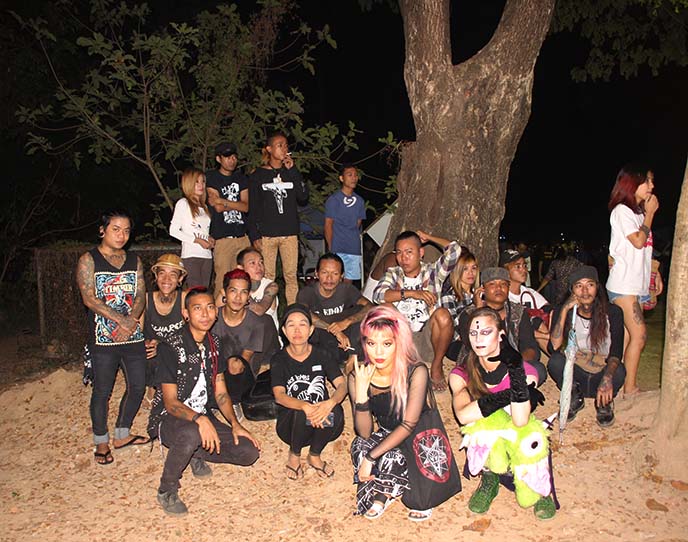
Yukiro and I called the theme of our Burma trip “Monks and Punks.” The two groups have more in common than you’d think: they’re all about inclusivity, compassion, and taking action to support others.
(You might remember from our Shwedagon Pagoda photos that this is the world’s most Buddhist nation.)

Before we arrived in Yangon, I reached out to The Rebel Riot band on Facebook (as they are one of the most prominent punk groups in the scene). We were keen to volunteer for their charities, and get to know Burma’s alternative, underground side.
Singer and songwriter Kyaw Kyaw welcomed us warmly. He invited us to Human Rights Day, where The Rebel Riot was performing an acoustic set.
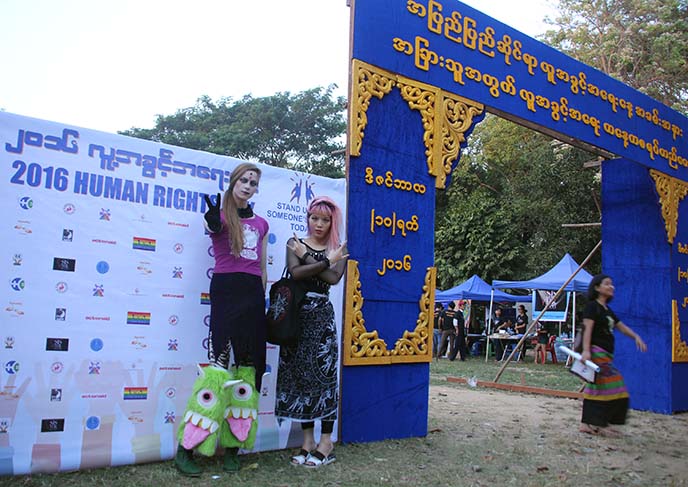
The free event took place outdoors, in People’s Park (not far from the famous golden temple).
As I mentioned in my first post about Myanmar, the country was formerly under a military dictatorship, which put up strict barriers for freedom of expression. The state of human rights is still a work in progress here (as it is everywhere — I’m not going to get into the specific politics). Still, it’s significant to have event like this one, run by young Burmese who believe in this mission.
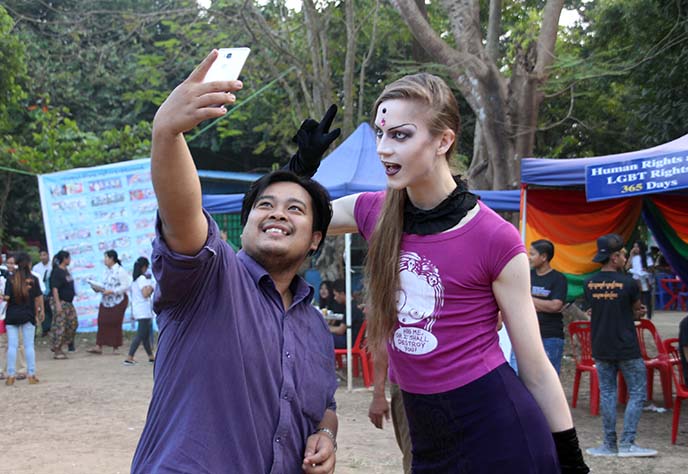
We were thrilled to meet locals at the event. I was impressed by their passion: they were here to stand up and speak out, for human equality and freedoms.
A lot of friendly faces came up to us, and asked to take photos together. Yukiro’s makeup and fashion were quite the sensation!
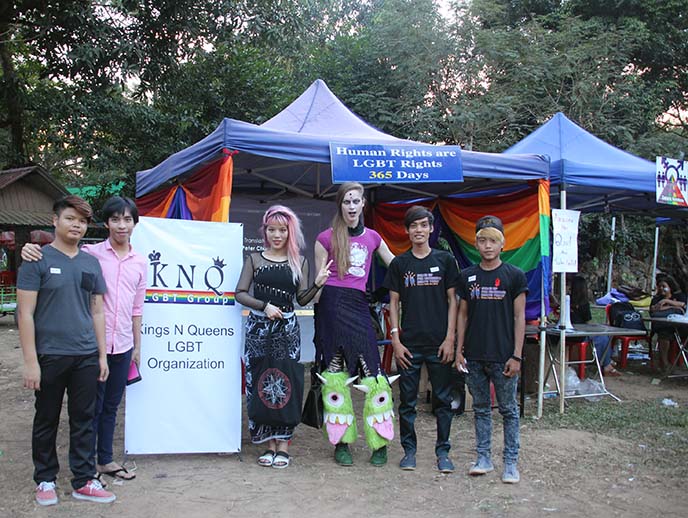
In recent years, the LGBT community has become more open and accepted in Myanmar. Still, same sex activity remains technically illegal, and the gay night at J-One Music Bar is sometimes shut down.
The King n Queens Organisation is doing wonderful work to advocate for equality in Burma. As their motto says, “Human rights are LGBT rights.”
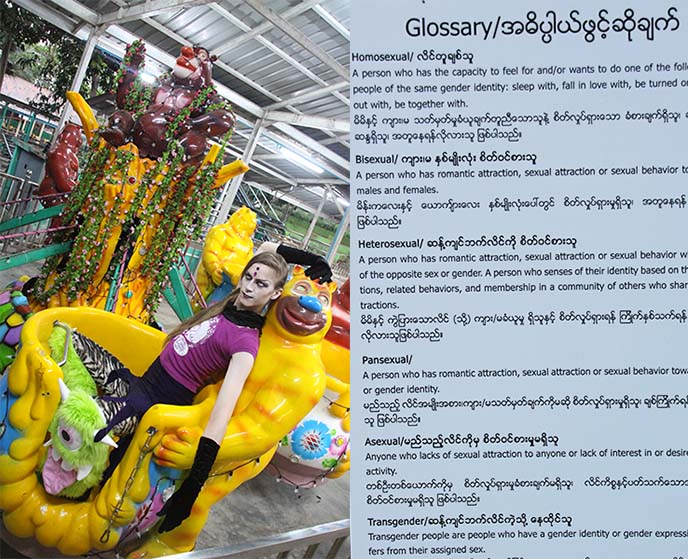
In addition to fighting the discriminatory laws, these LGBT groups are working to increase awareness and education. One giant placard contained a “glossary” with definitions in both English and Burmese. The terms include queer, pansexual and transgender (which are not instinctively known in this population).
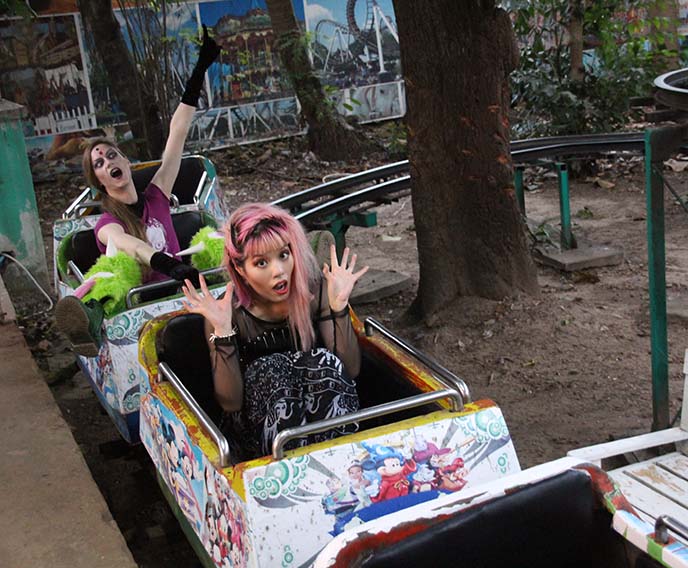
Next to People’s Park, we noticed a creepy abandoned theme park! This is the old “Happy World,” which looks like a derelict, haunted version Disney’s Fantasia. (It should be re-named “Unhappy World,” don’t you think?”
Anyone can access the run-down rides — so naturally, we posed inside the creepy roller-coaster cars. (More images at the end of this article; all photos by Sniper Chau.)

To celebrate Human Rights Day, various Burmese bands took the stage and performed. The Rebel Riot band did an acoustic set with their friends. Between songs, Kyaw Kyaw spoke from the heart about the importance of this cause.
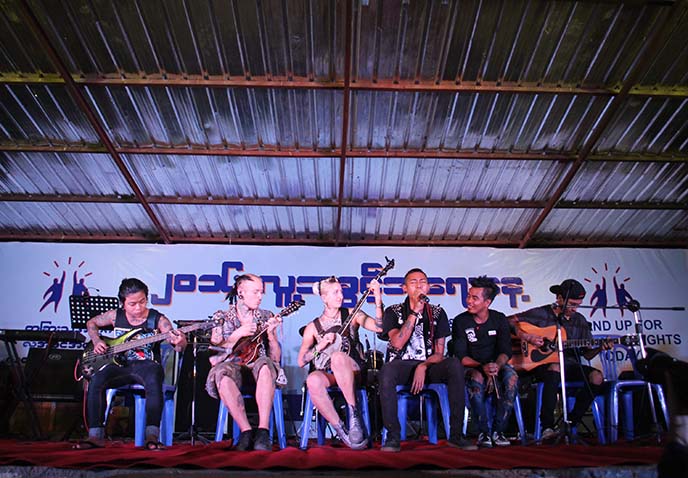
As he put it — he’s an advocate for human rights because as a human being, how could he not be? The fundamental rights to equality, free expression, and protection against unjust persecution should be extended to everyone in society.
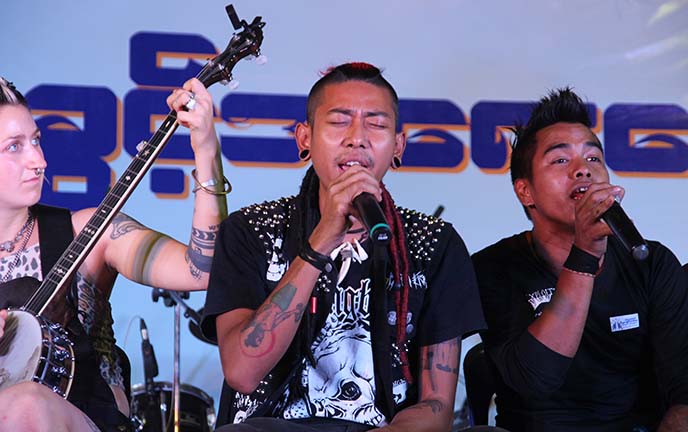
The Rebel Riot’s songs conveyed these messages with power.
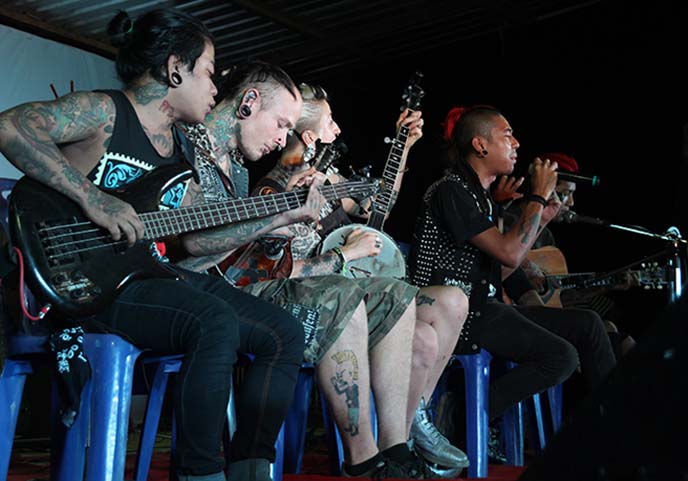
As Kyaw Kyaw’s nonprofits gain more recognition, many are coming to Myanmar to volunteer directly alongside him. My friends and I brought a suitcase full of school supplies for Books Not Bombs, which provides children with educational support (especially in conflict and rural regions of the country).
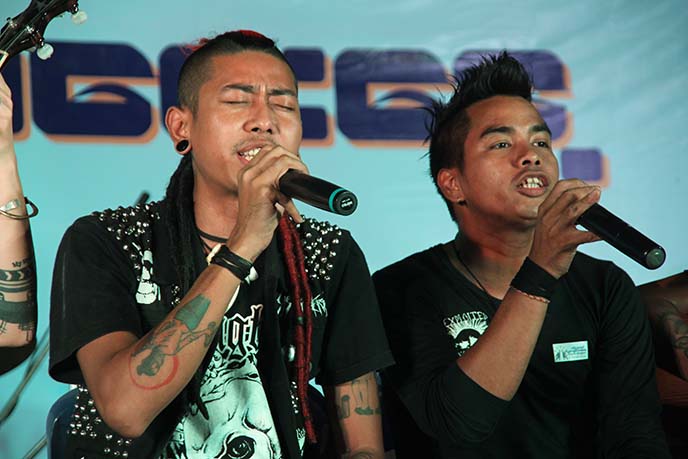
Every Monday night, his group Food Not Bombs purchases food and distributes it to the homeless and needy in Yangon. At first, locals weren’t sure what to make of these tattooed and pierced punk volunteers! However, their dedication spoke for itself, and the rockers are now welcomed each week with hugs.
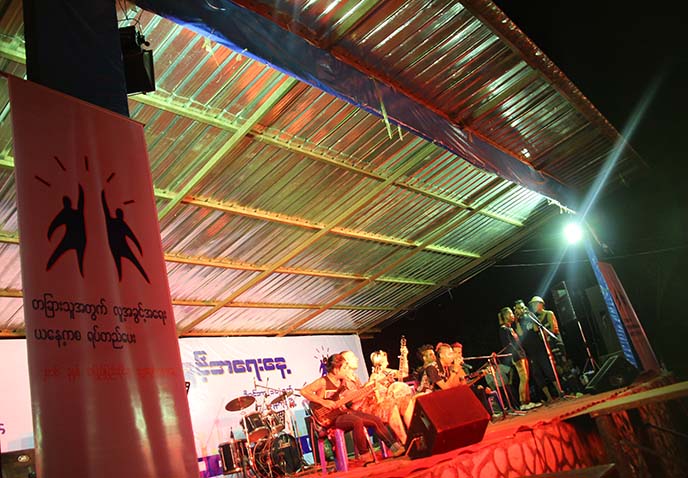
The logo at left (two people giving a high five) summed up the positive spirit of Human Rights Day, Yangon.

In the audience, we saw others with large gauge earrings, alternative dyed and shaved hair, and DIY studded and painted clothing.
It’s interesting (but perhaps not surprising) that punk ideologies have taken hold in Myanmar — as the country has recently broken free of military rule, yet continues to struggle with regional clashes and authoritarianism.
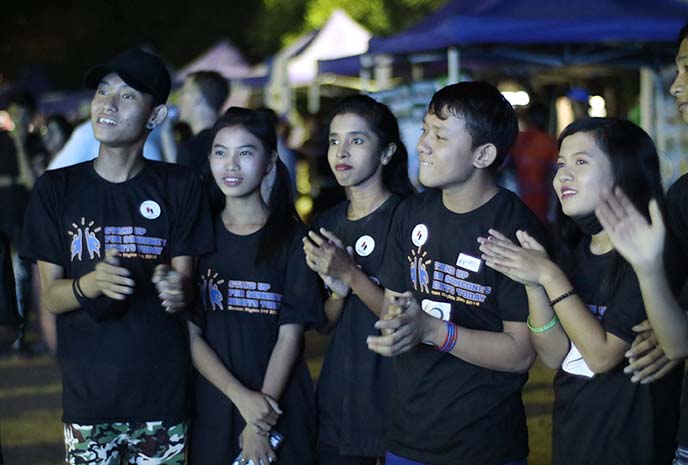
We have full confidence in the young Burmese volunteers we met. They’re progressive and full of energy, and will shape their homeland in a positive, inclusive direction.
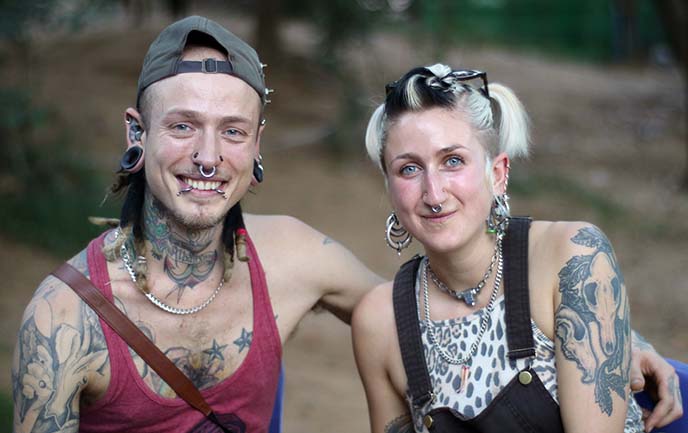
We wanted to get to know The Rebel Riot and friends better, so we made arrangements to hang out the following evening.

It turned out to be a grand gathering of Goths and Punks, at Rangoon Tea House! (Address: Ground Floor, 77-79 Pansodan Rd (Lower Middle Block), Yangon, Myanmar).

We sat down at a long table, and the boys laid out their tattooed arms. I see A for anarchy, hell on the knuckles, a skull, and two gasmasks on these sleeves.
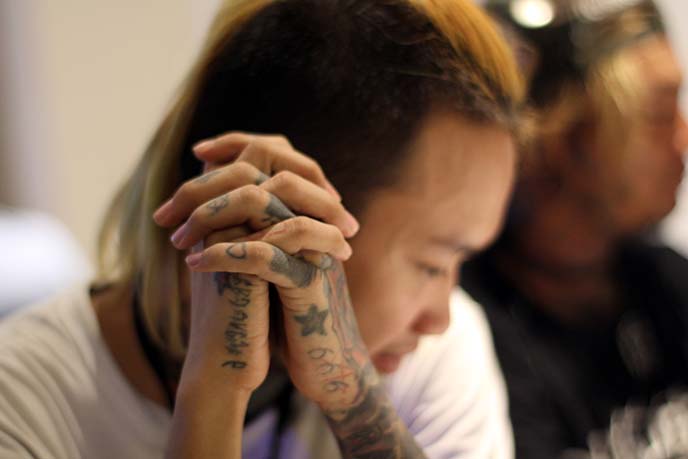
In true punk spirit, many of these tattoos are DIY. I spot 666…
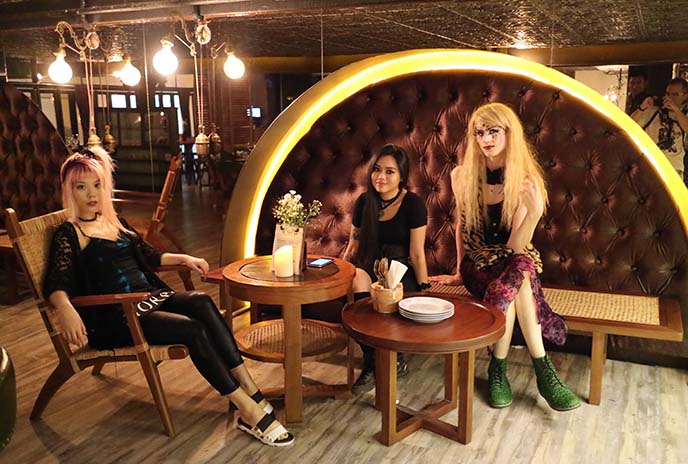
A lot of young locals and travelers come to dine at Rangoon Tea House, which is one of the highest rated restaurants in the city. The restored two-level space is reminiscent of the British colonial era, with classic molded ceilings and lanterns.

Rangoon Tea House is well known for its drink menu. The world-class cocktails are inspired by Asian flavors, such as a jasmine gin and tonic, and “Smoking Cheroot” with smoky cinnamon, bourbon and Hennessy, served on a thanaka tray.
At the entrance, we saw the staff preparing tea from the finest grade pindica leaves, aerated with a long pour from above.

Goths in the back, and punks in the front! I’m standing next to Esther, a Gothic makeup artist, and Ze Ze, vocalist and composer of the band Maze of Mara. We quickly became fast friends — amazing how you can find like-minded spirits in the most unexpected of places.

“System Error” — so good. Tattooing isn’t taboo here, as it is in Asian countries like Korea and Japan. There’s also a history of tattoos among ethnic groups in Burma, up until the 20th century.

As you can see from our smiles, we loved the food at Rangoon Tea House. The mohinga (Burmese fish noodle soup) was so delicious that we ordered two bowls! This national favorite dish is made from fresh Rakhine daggertooth fish, and perfectly balances sweet, sour, salty and spicy.

The menu is a homage to Rangoon’s past — when traders from different countries mingled with colonial settlers and locals. We ate up every bite of the Indian-inspired curries, biryanis, samosas, rotis. Other highlights included British Pimm’s, and traditional Burmese “ohn note kauk” chicken and noodles in coconut broth.

As you can see, the boys were fans of the Burmese beers.

A meal to remember, followed by a night of more laughs, drinks and shenanigans!

On a different evening, we dined at the amazing Yangon Green Gallery — a Thai restaurant that is the favorite hangout of expats and young artistic types. We were sold on the chalkboard sign: “Let us tickle your tastebuds and fill your stomachs.”
Green Gallery Address: Mahabandoola No 58, 52 Street Lower Block, Between Mahabandoola and Merchant, Yangon 1116, Burma.

The friendly owner, Bo, welcomed us with gusto, and insisted that we make ourselves at home. Once again, we found a kindred spirit — we bonded over the 1980s songs that she broadcast all night, from Europe to Eurythmics!

Bo used to live in Thailand, and brought these traditional flavors to her cooking. At the same time, Green Gallery is as modern as it gets: she brought us gin and tonics with colorful straws, and we admired the industrial, bohemian design of the restaurant.

It’s wonderful to see women like Bo put their hearts into their independent businesses, and succeed.

My mouth is watering as I reminisce about our meal at Green Gallery! The menu is simple, with a focus on fresh and healthy — yet comforting — Thailand dishes. The items change with the seasons; we started with spicy salad Larb Mhoo, and adored the panang and green curries with rice. Leave room for the coconut sticky rice and mango dessert, which is full of love.

As you can see, the tables fill up quickly, especially with groups of expats. The restaurant also hosts a monthly Green Party that draws in lots of friendly, young faces.

We could have stayed all night, grooving to the 80s songs and joking with Bo about thumb sizes. There’s no better place in Yangon to get a heart-warming meal than Green Gallery. Please say hi to her for us!
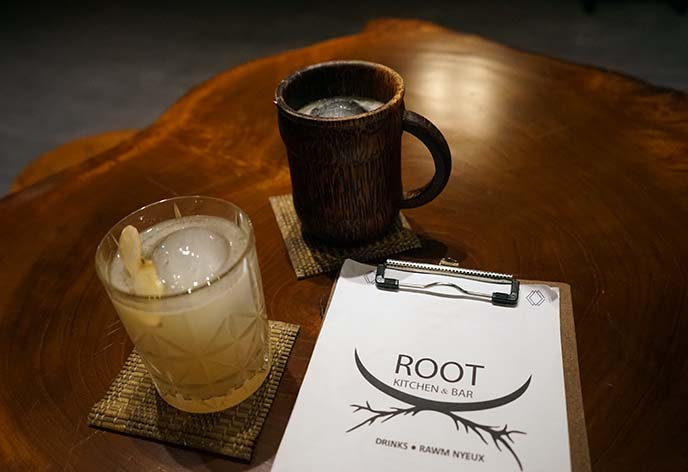
We chatted with someone at the next table, and he suggested that we visit Root Kitchen and Bar for a “Wa-Tang” cocktail. His recommendation was on point: the drinks are perfectly concocted with ingredients like tea, lemongrass, ginger, and a special Wa-region liquor made from rice and barley grains.
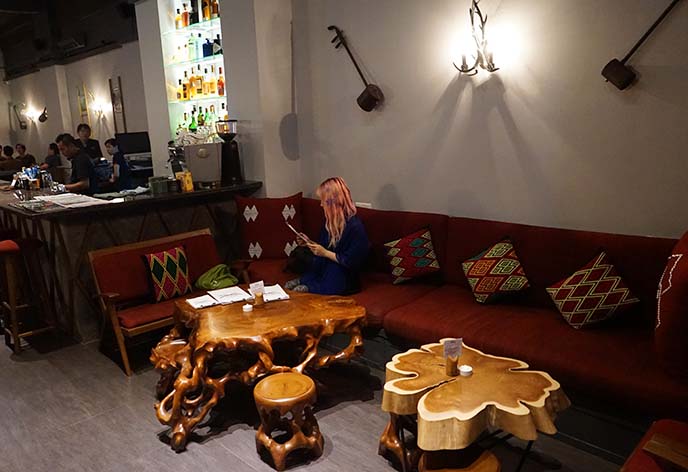
Root is a new restaurant and bar, which pays homage to the Wa people who live in Shan State. This region of Myanmar is often dismissed as a drug and conflict-ridden borderland, so these owners wanted to showcase Wa culture, art, and food in a comfortable space.
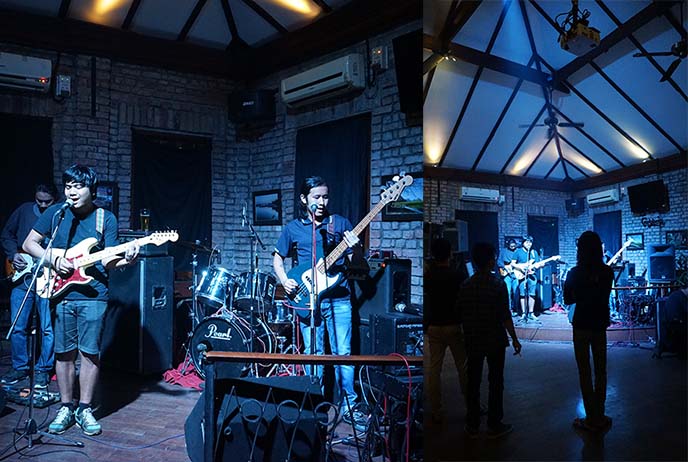
Later, we met Bo and other new friends at the nearby 50th Street Bar (there are lots of bars and hip restaurants in this district). This venue is known for its live concerts — that evening, we watched several alternative bands perform.
SHARE & COMMENT
A sunrise visit to Shwedagon Pagoda in Yangon, Myanmar! Burma golden temple, Buddhist travel destinations.
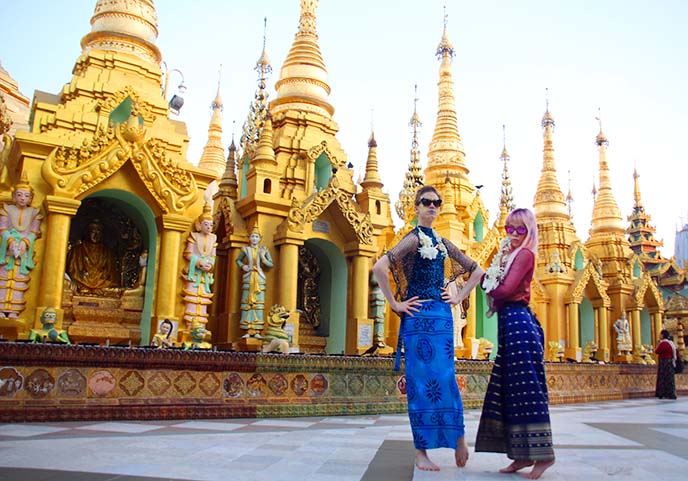
I’ve been to temples all over Southeast Asia, but none has been as extraordinary as Shwedagon Pagoda in Myanmar. In this photo diary, Yukiro and I will show you why!
Before we begin our pilgrimage, I’m humbled and thrilled to announce that I won the Best Blog of the Year award! A zillion thank yous to everyone who voted in the Auxiliary Magazine awards. None of this would have been possible without your support throughout the years. Congrats to the other winners and fabulous nominees, and I am excited to keep on bringing alternative travel stories to you in 2017.
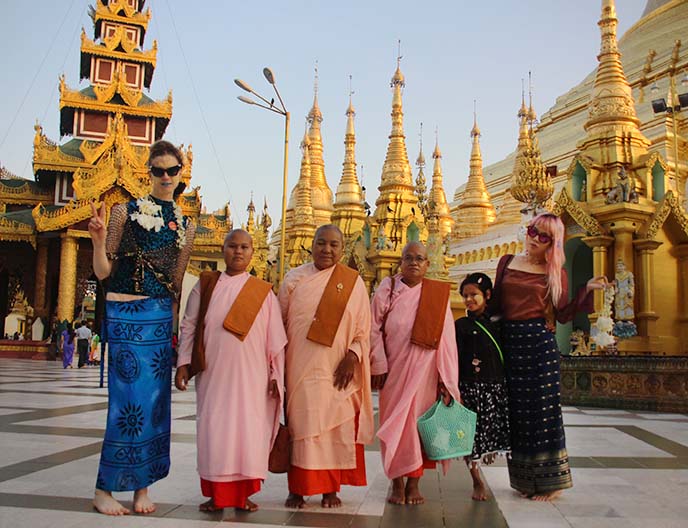
Yukiro and I are standing inside Shwedagon, with lovely locals. This huge golden Buddhist temple complex dominates the Yangon skyline, and is one of the most sacred sites in Myanmar (Burma). The name breaks down to “shwe” (gold in Burmese) and “Dagon” (the township where it is located).
That day, we met the kindest, gentlest Buddhist nuns, dressed in pink robes…
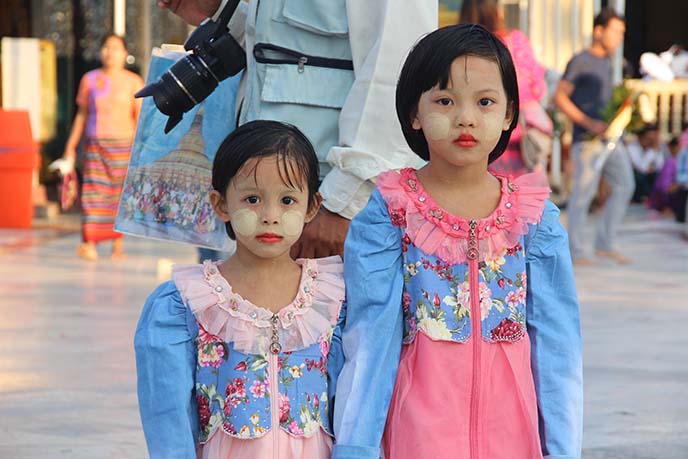
… and children with thanaka (sun-protecting face paint) on their cheeks. (All photography by Sniper Chau.)
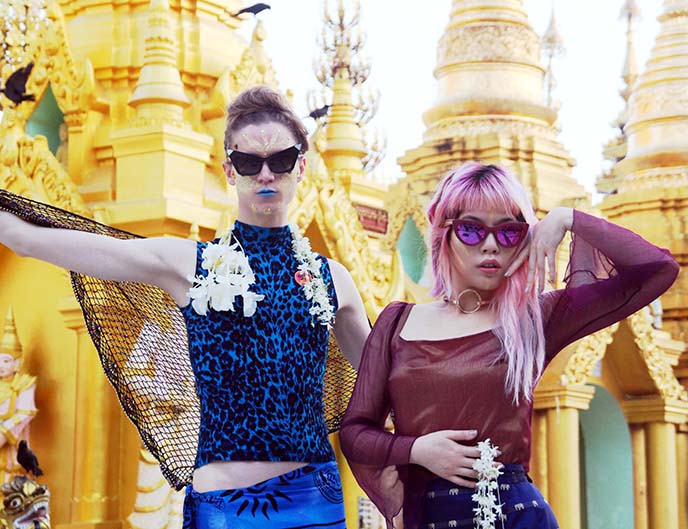
Let’s begin our visit to Shwedagon Pagoda with a note on the dress code. Out of respect to those who come to the temple to worship, all visitors (male and female) should wear clothes that cover their legs and shoulders. Shorts aren’t permitted, but there are longyi that you can borrow at the front if you forget.
Despite the clothing restrictions, you can still glam it up — as we did! We wore long wrap skirts (mine is from Thailand), and lightweight tops that kept us from overheating in the humid weather. (Yukiro had the shawl over his arms except for this moment of posing!) Sunglasses are a must, as the golden glare hits hard once the sun rises. In addition to sunscreen, we painted some thanaka over our skin as well.

We met our ParkRoyal Hotel Yangon driver in the lobby at 6am, as we wanted to catch the dawn. It’s worth waking up early, as sunrise and sunset are the best times to visti Shwedagon Pagoda. (You also avoid the crowds and the high noon-time heat this way).
The temple is open from 4am to 8pm, and the entrance fee for foreigners is $8 (about 8000 kyat — make sure you have the local Burmese currency). Everyone must remove his or her shoes at the entrance, and go barefoot inside the complex. If you’re a foreigner, there’s a special rack where you can store your shoes (otherwise, you’d have to carry them with you).
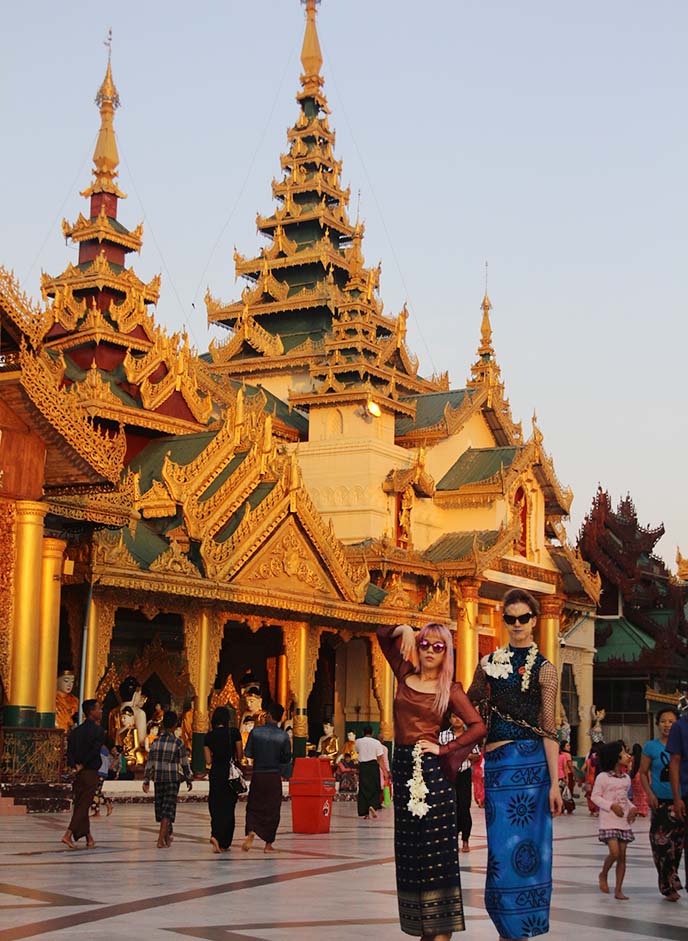
We walked down the long corridor, and bought a fragrant strand of white flowers. It opened up into this mesmerising plaza filled with gilded architecture and colorful Buddhist statues — we felt as if we’d entered a new universe.
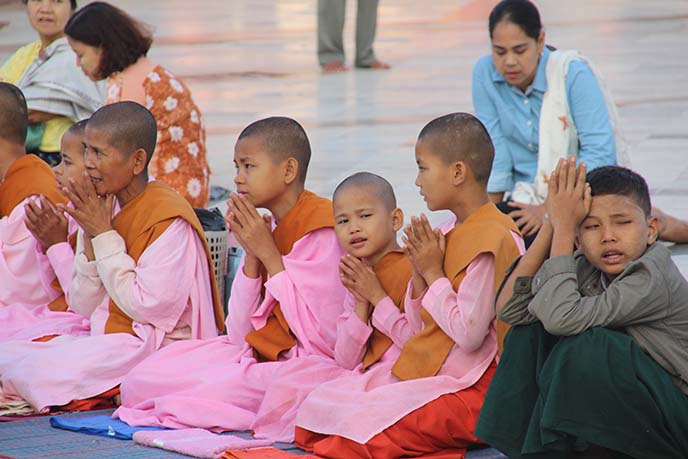
Shwedagon is a feast for the eyes and senses. It’s filled with an energy of compassion and happiness — as personified by these praying, chanting Buddhist children.
The pagoda sits on Singuttara Hill, and holds the relics of four Buddhas. The first version was most likely built by the Mon people between theb Shwedagon Pagoda was pillaged many times, rebuilt and expanded, and struck by earthquakes — but has stood strong, and is grander than ever.
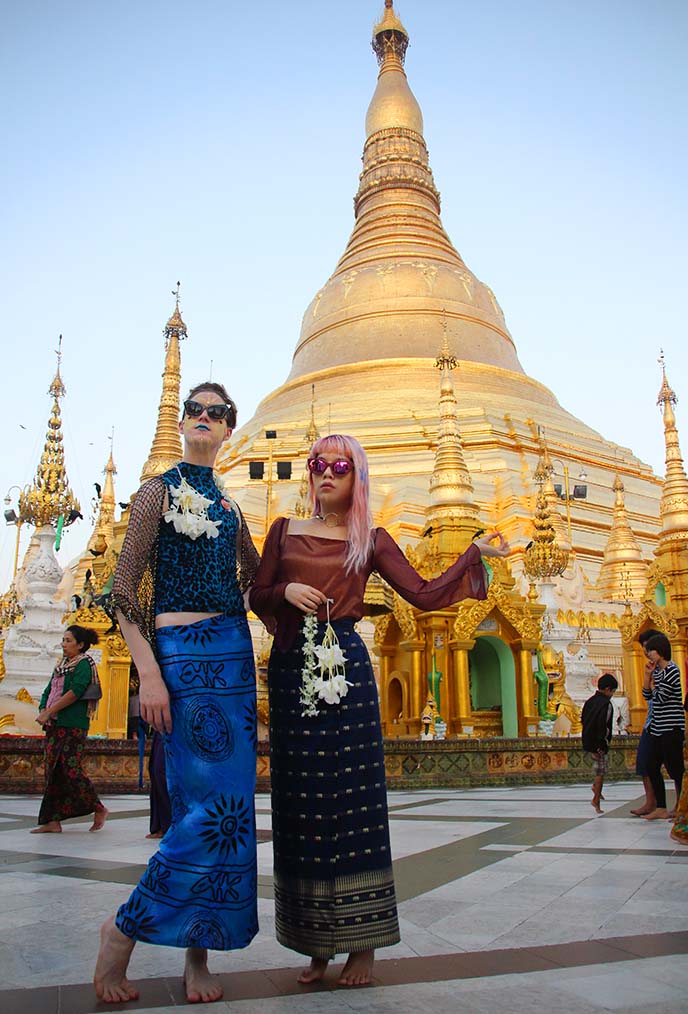
Could there be a destination more fabulous than this one?
Shwedagon is the largest stupa in the country, at 99 meter high. It’s plated with over 20,000 gold bars, with a tip decorated with thousands of diamonds, rubies and sapphires. The various buildings hold treasures of Burmese art, including the Tharrawaddy Min Bell that weighs 44 tons.
(In the 17th century, a Portuguese adventurer stole the 300-ton Great Bell of Dhammazedi — but it fell into the Bago River and was never recovered.)
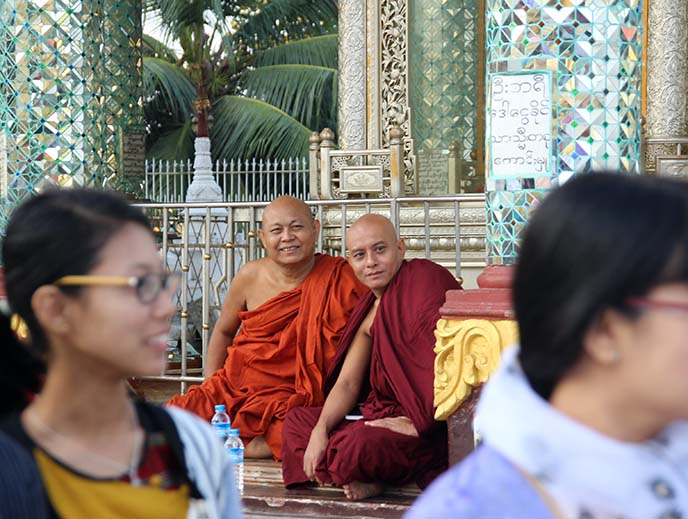
Myanmar is the world’s most Buddhist country, with most locals identifying as Theravada Buddhists. It’s a regular sight to see monks and nuns of all ages in the city, and we encountered many smiling faces here.
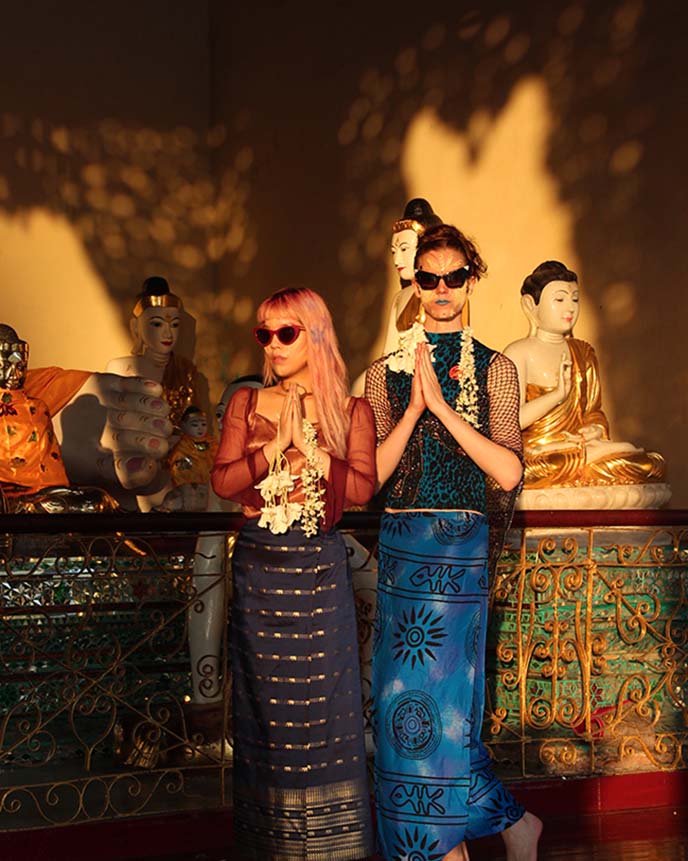
I think Yukiro and I fit in rather well with the decadent, golden art!
Visitors can spend hours wandering into the various buildings, where there are thousands of Buddha statues and relics to behold.
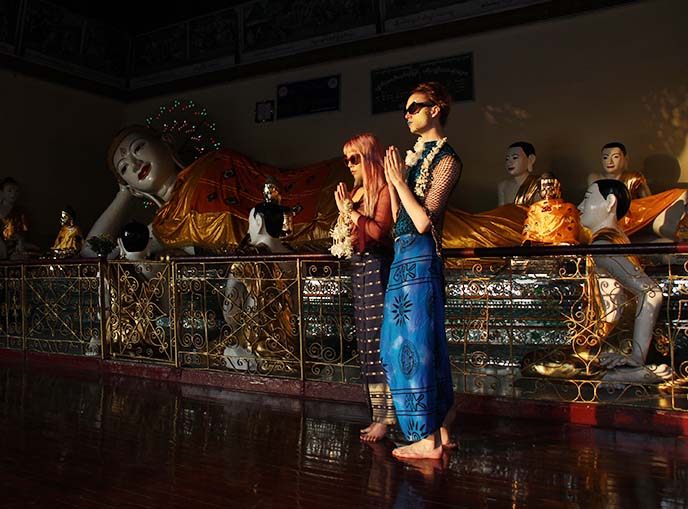
Although Shwedagon Pagoda is centuries-old, and has traditional architecture, you’ll also see modern incarnations. Such as this reclining Buddha with a flashing, electric cyber-disco halo around his head.
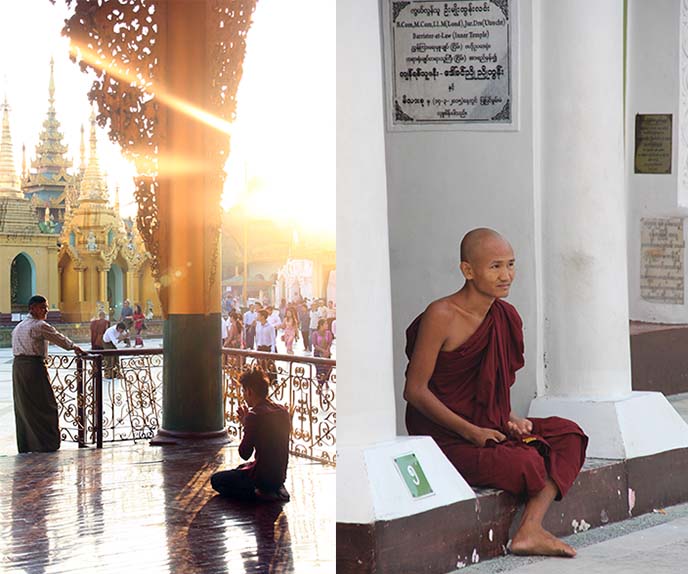
The spirituality is open and welcoming in Myanmar. We saw punk rockers praying, and monks with tattoos. Some locals choose to become monks or nuns for a short period of time (such as few weeks or months).
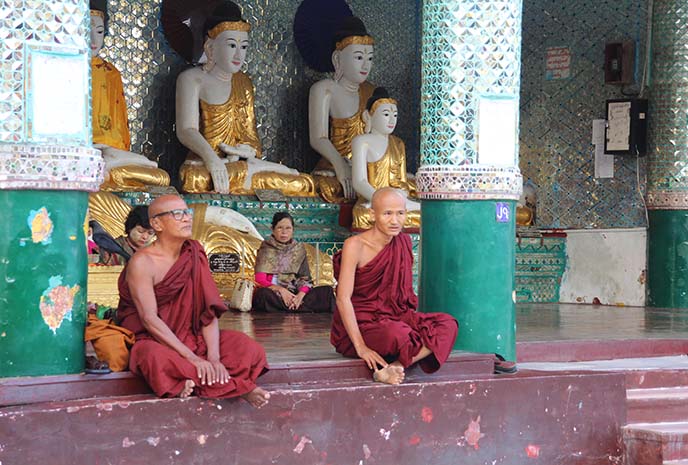
I wasn’t too familiar with Burmese sculpture / art until I visited, and was in awe. In this tradition, Buddhas are smiling and friendly, and draped in golden robes.
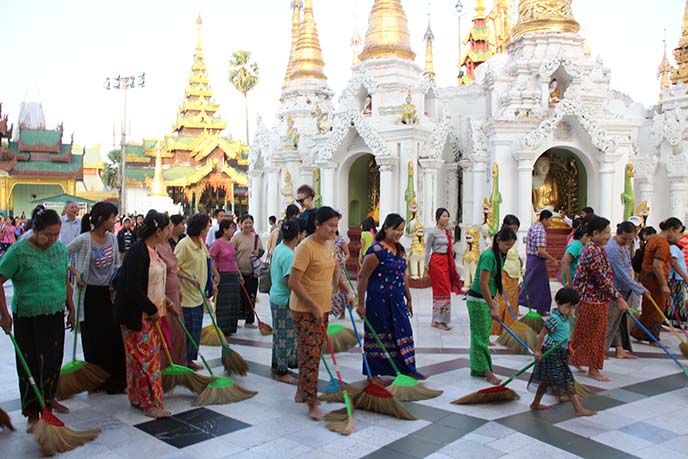
We had no issues walking around barefoot, as the tiles are kept clean by volunteers with mops. Locals have always pitched in to preserve Shwedagon, taking part in activities such as sweeping the floor, washing the statues, and repairing damaged areas.
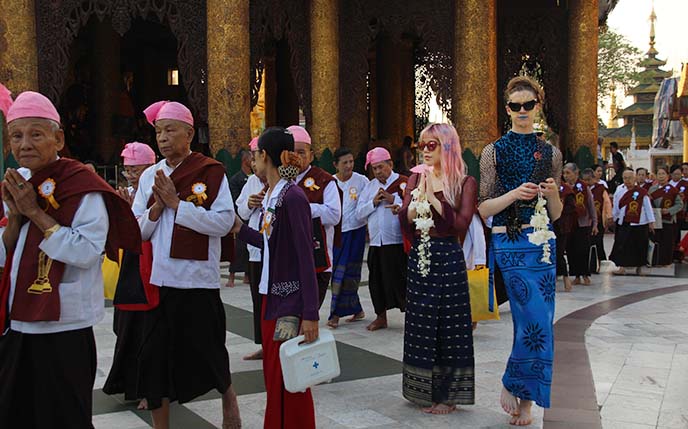
The stupa is a top Buddhist tourism destination. We saw a tour group of men and women in pink headwraps, travelling together on a spiritual pilgrimage.
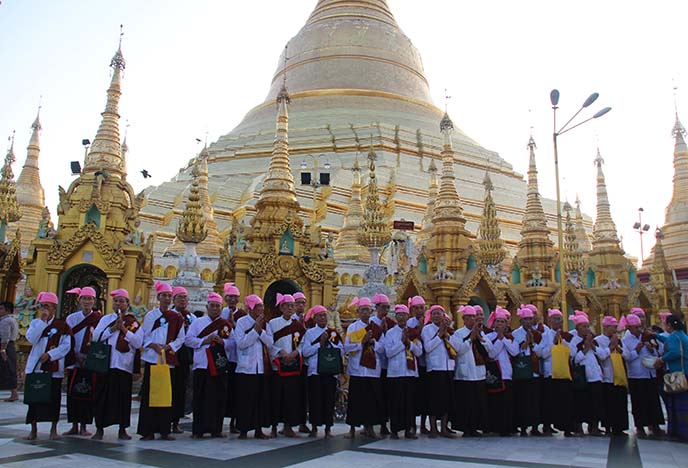
I loved seeing the joy and tranquillity on everyone’s faces.
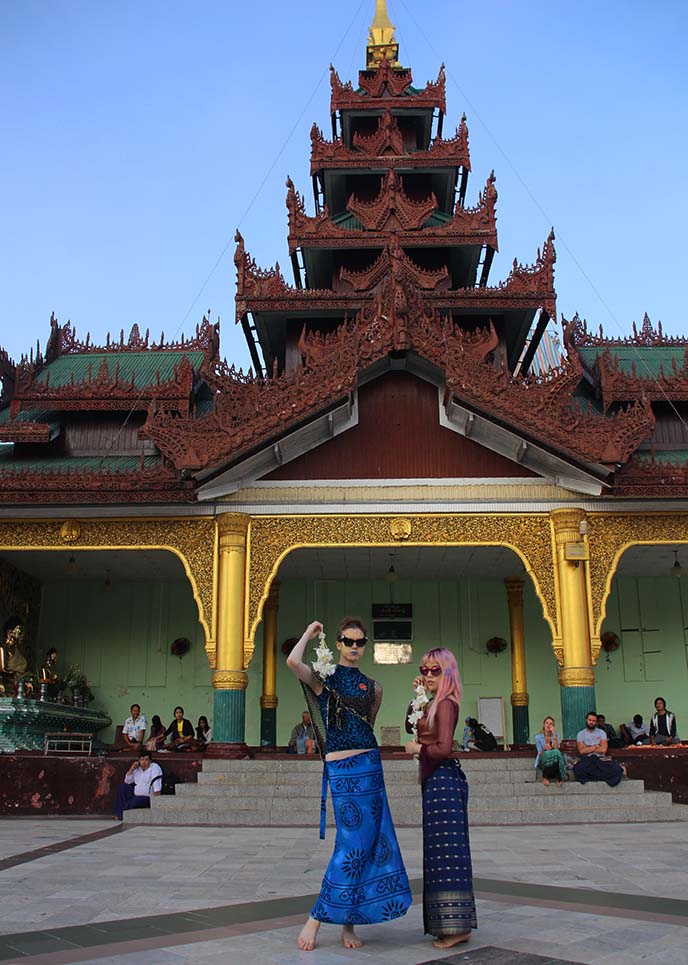
Burmese architecture ranges in styles. This reddish-brown spiky roof spoke to our Gothic aesthetics.
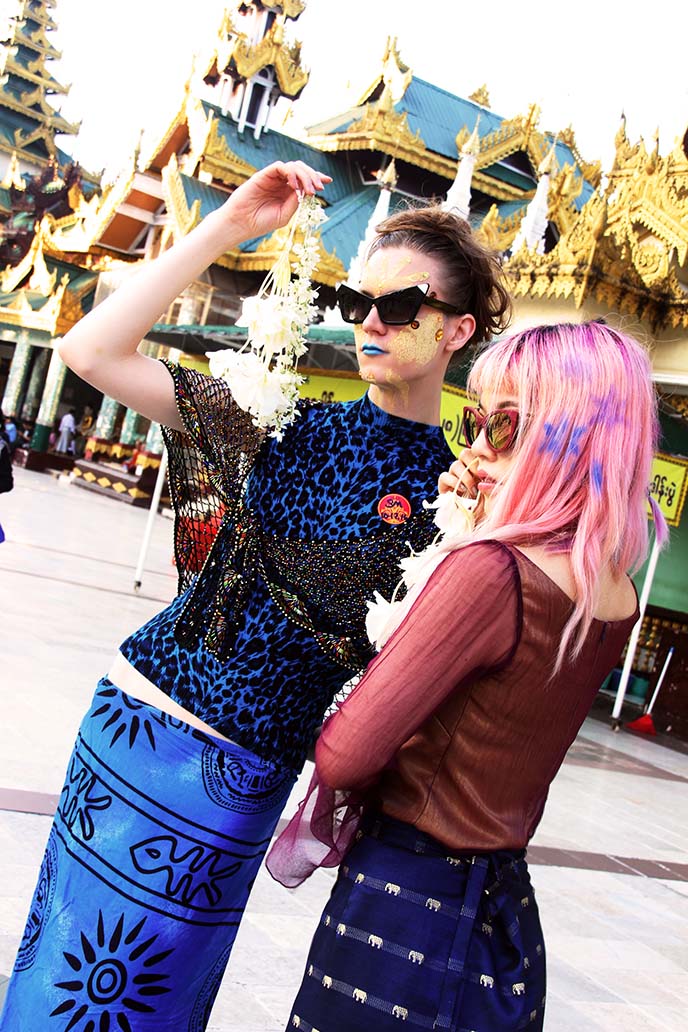
As the sun continues to rise, the tiles heat up. It’s good to go early (as we did) so that you can leave before high noon.
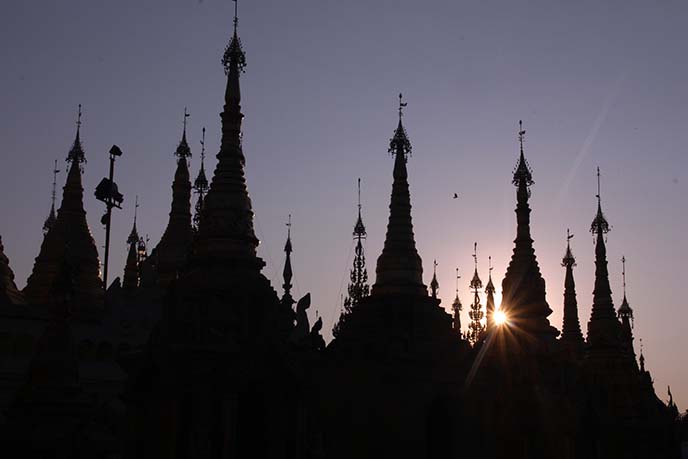
As author Rudyard Kipling described it: “Then a golden mystery upheaved itself on the horizon, a beautiful winking wonder that blazed in the sun.”
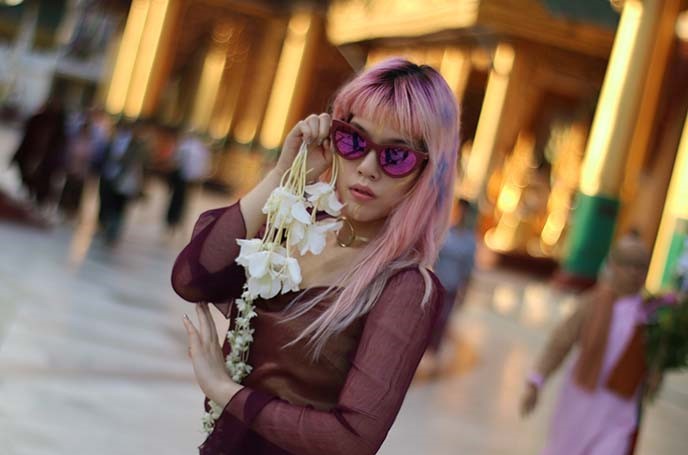
Wearing cat-eye sunglasses by Moat House Eyewear, which match my pink hair and top.

A lot of locals came up to us, and gently asked to take photos together. We got nothing but compliments on our outfits and style.
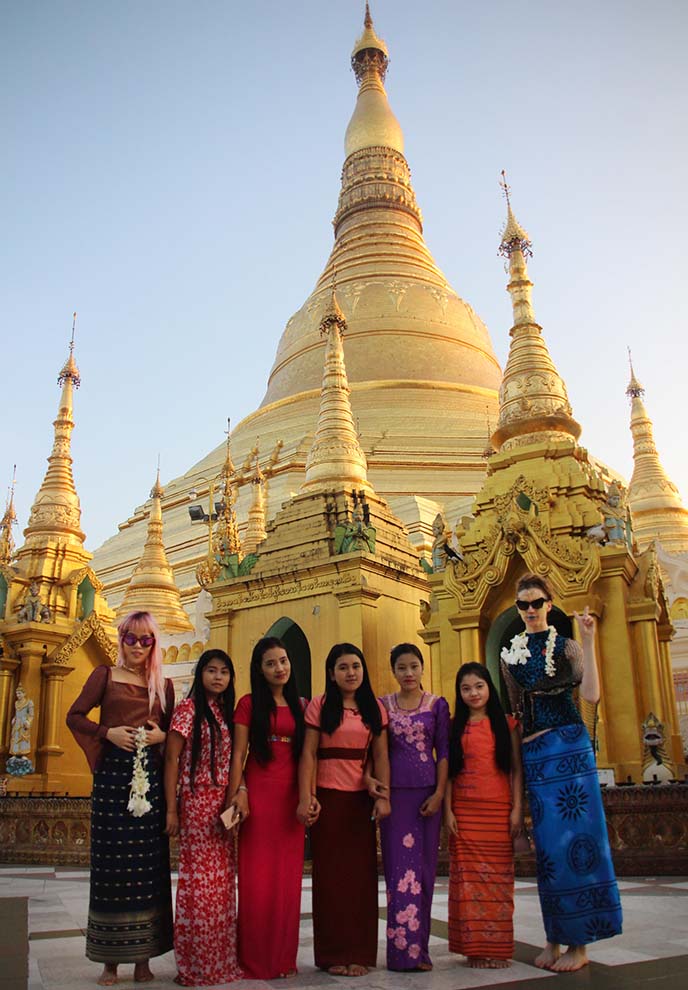
We became fans of the elegant, traditional fashion — particularly these Burmese long skirts, or longyi. This group of women shows it’s possible to be chic while following the dress code.
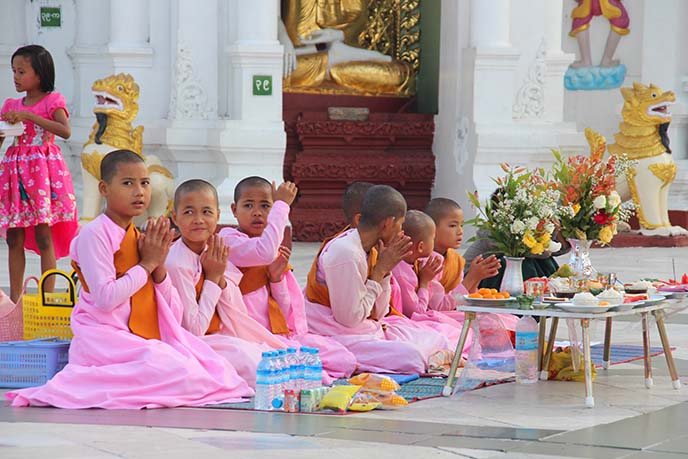
Offerings of fruit and flowers for the Buddha, made by these young devotees.

Loved seeing the small moments of generosity all around Shwedagon Pagoda.
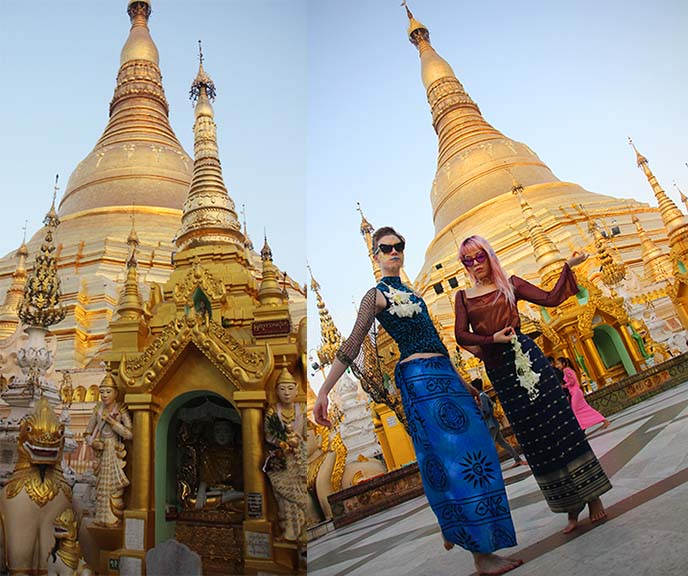
Myanmar has only recently opened to tourists, which means landmarks like these are still very locals-only. We saw only about 10 foreigners during this visit, and there weren’t any gift shops or touts.
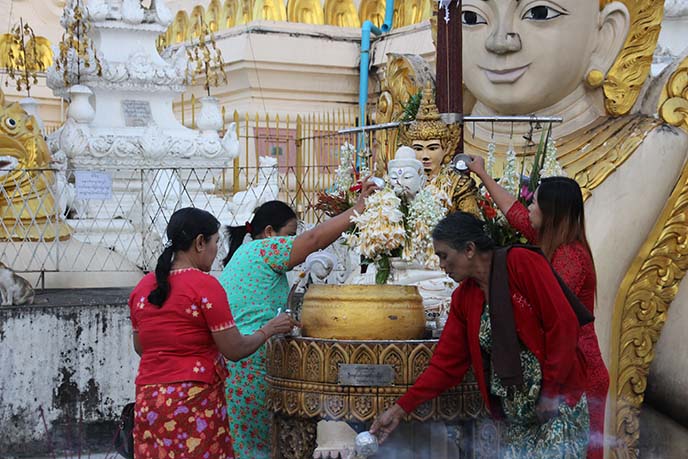
Many Burmese also follow traditions that come from Hindu astrology. They pour water and perform purifications at their “planetary post,” which refers to the day of the week they are born on. For example, if you were born on “Wednesday Morning,” you would look for a basin with this signpost, and make offerings and wishes there.
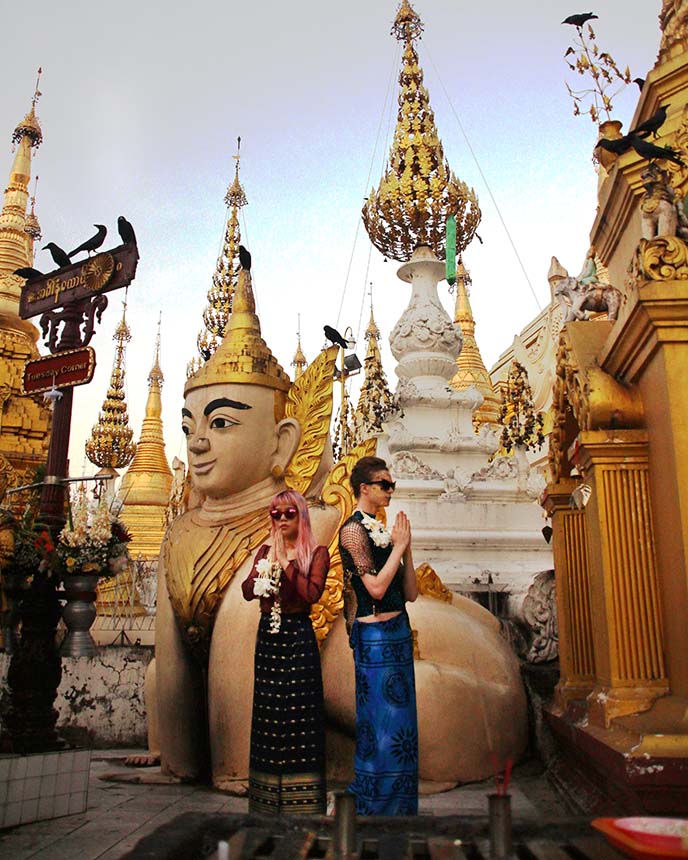
On the left, you can see the sign for “Tuesday Corner.”
We didn’t know which day of the week our birthdays fell on… but the giant leogryph (mythical lion creature) looked like our spirit animal.
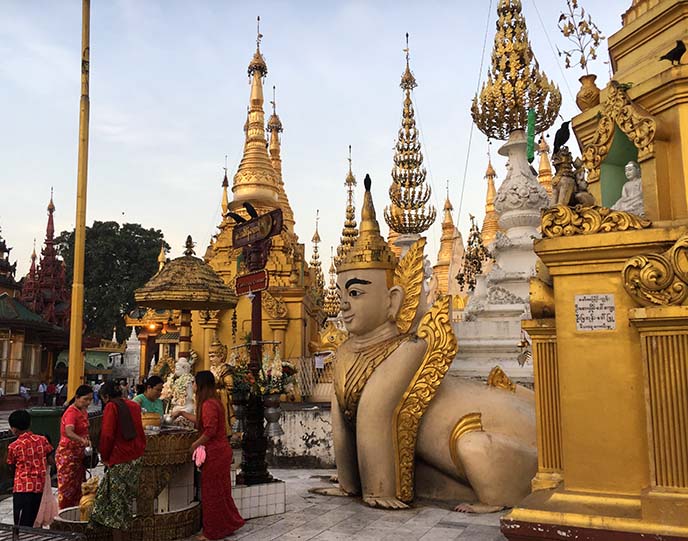
This protector lion being is a “chinthe”, often found at the entrances of pagodas and temples in Burma, Cambodia and Laos. Love the sideways-facing paws.

Snakes are another guardian, depicted with vampire-like fangs. The precise carvings found all over Shwedagon are impressive.
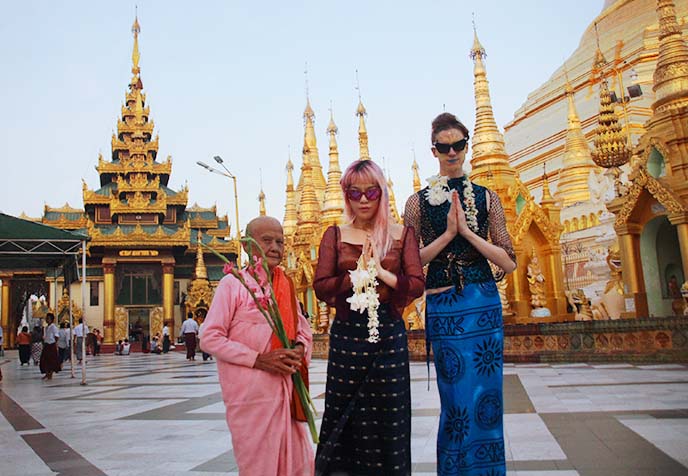
Photography is allowed in Shwedagon Pagoda. Anyone can respectfully ask monks or nuns if they’re willing to take a photo. However, as our guidebook counselled, one must not touch their robes (not even for a friendly pose).
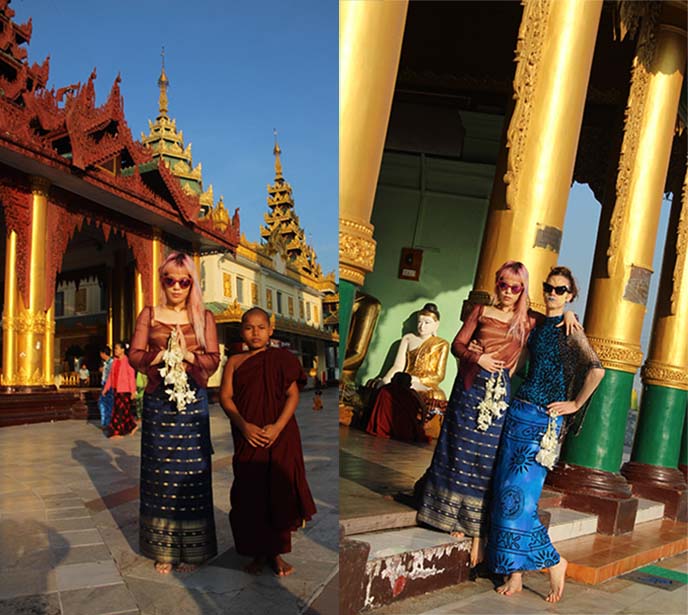
As you can see — it’s ok to stand next to a monk after getting his consent to take a photo together. But langorous arm-draping is a no-no!

Burmese children grow up learning the founding legend of this stupa. Once upon a time, two brothers were traveling when they met the Buddha beneath a tree. They offered him food, and as a thanks, the Buddha gave them eight hairs from his head!
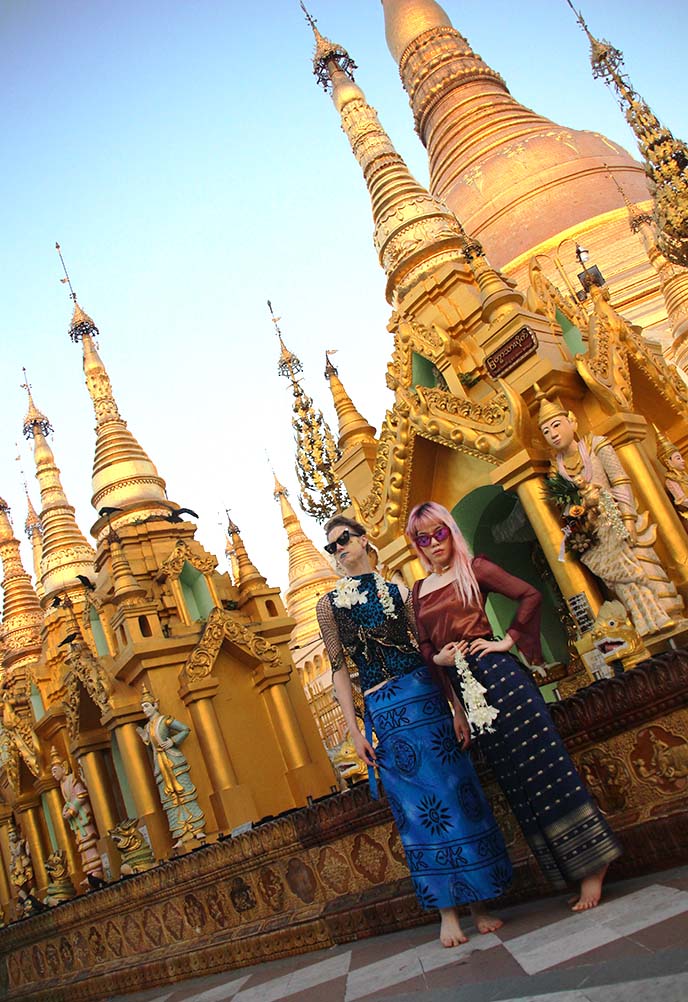
The brothers put the 8 hairs in a ruby casket and carried them back to Burma, where they started to build Shwedagon Pagoda with the help of their king.
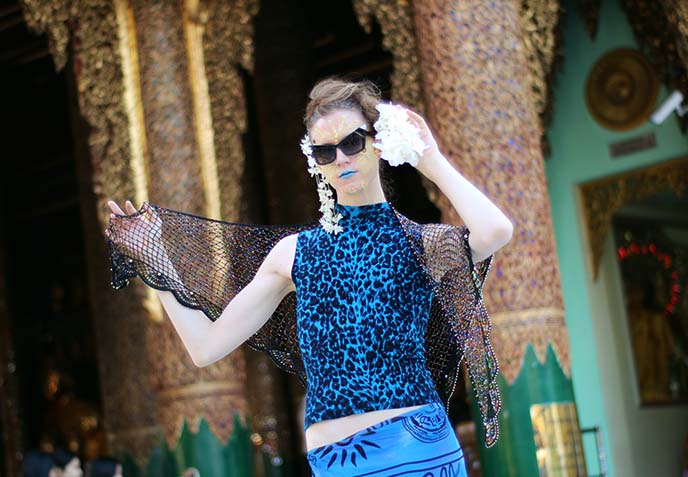
There are other relics preserved in the temple complex, ranging from sacred robes to… an ancient water filter.

This sign illustrates the story of the Buddha’s journey to enlightenment. Love the rainbow colors, and the gorgeous Burmese script.

It’s apparent how much meaning the Buddhist teachings have to locals here, through each stage of their lives.
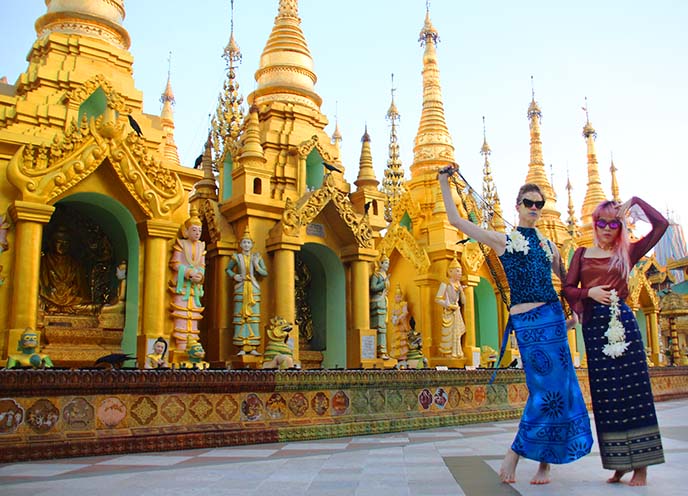
We’re very glad we got to spend time in Myanmar, a travel destination that people often overlook.

Such an interesting contrast between monastic simplicity, and golden richness.
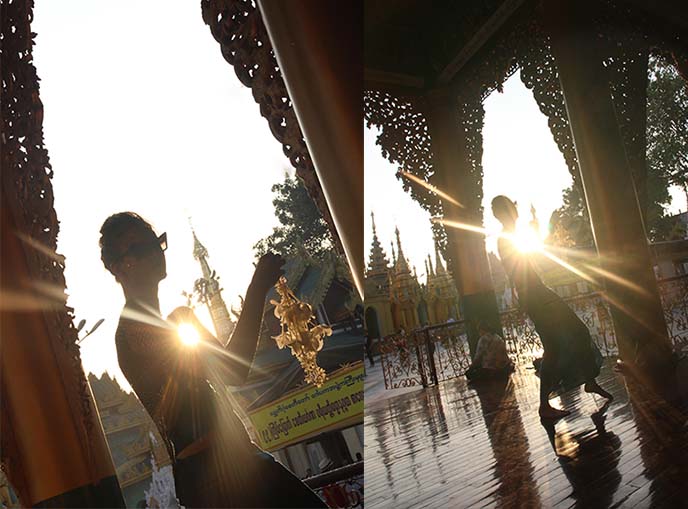
When we saw these flares of light, we knew why “Shwedagon Zedi Daw” is also know as the Golden Pagoda.

Don’t forget to walk around the edges of the complex, which tend to be quieter, and filled with surprses. Such as: a bodhi tree.

Siddartha Gautama meditated under a bodhi tree until he attained nirvana. Perhaps this monk, crouched under the canopy, will follow his path.

We encountered this lion guardian on the outskirts as well. The pale pink claws are on point.

Shwedagon is heaven for people-watching and photography. (All images by Sniper Chau.)

The women we met were stylish and self-possessed. The Burmese are known for their welcoming nature, perhaps testament to the Buddhist culture.

This nun smiled at us as we passed by, and her group of children followed suit. Moments like this remind me of why I travel.

I hope this photo diary conveyed the magic of Yangon’s Great Dagon stupa. Although the pagoda is not a household name, it now ranks among my favorite wonders of the world (and I’ve been to Petra, Angkor Wat, Hagia Sophia and more).

Coming up: we’ll show you more of Yangon, including Sule Pagoda and art galleries. A big thank you to ParkRoyal Hotel for the driver and travel tips. (See our review of ParkRoyal Myanmar here.)
Have you heard of Shwedagon before? Isn’t this spiritual site inspiring? Thank you again to everyone who voted for me in the Best Blogger of the Year awards — none of these adventures would be possible without your love!
 LA CARMINA
LA CARMINA






